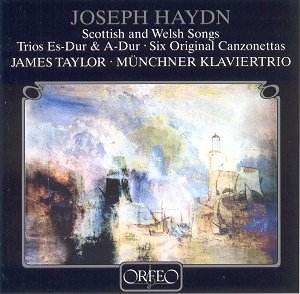As
tradition has it, Haydn’s arrangements of Scottish folk songs
began as an act of charity to help a musical acquaintance in
debt. However, it seems that Papa Haydn had quite an affinity
for these charming ditties beyond their altruistic possibilities:
by 1804 he had arranged over four hundred folksongs of the British Isles. These are pieces that carry
no pretension, and hearing them is pure joy. For some reason,
the vocal music of Haydn is often neglected by professional,
concertizing singers and left as pedagogical exercises for beginning
students of vocal performance. This disc stands as a strong
argument against this practice. The songs on this disc, both
the folksong arrangements and the canzonettas, are refreshing
and invigorating. The melodies are striking in their simplicity
and elegance. Throughout the folksongs especially, the prosody
is full of rhythmic twists and turns which, while always sounding
natural, keep the listener engaged and entertained. James Taylor
imbues these pieces with incredible lyricism. His voice is unquestionably
gorgeous, and his clear, natural production eradicates any sort
of operatic affectation. His diction is virtually flawless,
and his vast palette of vocal color tells the stories vividly.
The Müncher Klaviertrio plays with him (the Scottish and Welsh
songs) quite well. Balance is always far above acceptable. Koeckert
weaves an incredible line around Taylor’s voice, oftentimes matching timbre spectacularly. The cello articulation
is occasionally a bit harsh and too marcato, but through the
vast majority of the time, Zank provides solid bass support.
The Canzonettas are for piano accompaniment only, and in these,
Donald Sulzen truly shines. His playing is ultra-informed by
the text, and balance is never an issue. This is quite a feat
when one realizes that Haydn’s writing often includes octave
or unison doubling of the vocal line.
The
two trios included on this disc show the Münchner Klaviertrio
at its best. Playing is always sensitive: articulation is unified
and interesting, and special attention is given to natural,
rhetorical phrasing. Dynamics seem to be this trio’s weakness
as often it seems as though everything stays between a solid
mezzo-forte and double forte. It is a shame because the phrasing
is otherwise so impeccable and more dynamic variation could
have rounded these performances out as no less than miraculous.
Tempi always seem natural and un-hurried: there is no fast playing
for the sake of fast playing. This recording represents the
highest level of tasteful, subtle execution.
This
recording is a must-have! Finding a better recording of these
Haydn vocal works will be a challenge.
Jonathan
Rohr

![]() James Taylor (tenor)
James Taylor (tenor)![]() ORFEO
C117051A [75:32]
ORFEO
C117051A [75:32]










